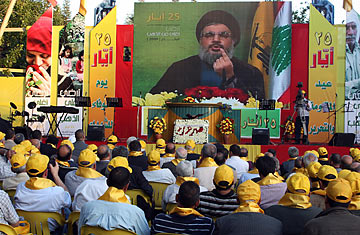
Lebanese Hizballah supporters listen to the movement's Hassan Nasrallah deliver a televised speech from an undisclosed location during a rally in Baalbek on May 29, 2009
If the street protests roiling Iran since its disputed election have created a problem for the leadership in Tehran, imagine the dilemma it raises for Iran's allies elsewhere in the Middle East. Hizballah leader Hassan Nasrallah was quick out of the blocks to congratulate President Mahmoud Ahmadinejad when the authorities announced his re-election, calling the result a "great hope to all the mujahedin and resistance who are fighting against the forces of oppression and occupation." But since supporters of defeated candidate Mir-Hossein Mousavi have taken to the streets to decry the election as rigged, Nasrallah has become more circumspect. And he specifically refuted suggestions that either candidate might be more pro-Hizballah than the other, merely saying that "Iran is under the authority of the Wali Al Faqih [divinely-inspired clerical rule] and will pass through this crisis."
As a longtime client of Iran, Nasrallah is wise to hedge his bets, for he'll need patronage and weapons from whoever emerges victorious in the post-election battle. But his caution is more than just good politics: the electoral crisis in Iran poses a problem for Hizballah and other Iranian allies in the region that goes far beyond simply who controls the purse strings in Iran.
For Syria, Iran's closest ally, the problem hits close to home: a mass anti-government protest movement over allegations of a fraudulent election is not a welcome sight for an authoritarian regime whose President, Bashar Assad, won his first presidential referendum with 97% of the vote. (No surprise, then, that the official Syrian Arab News Agency website is largely ignoring news of Iran's election.) For Syria, the sooner the Iranian government cleans up this mess — by any means necessary — the better.
But for Iran-backed "resistance" movements such as Hamas and especially Hizballah, the dilemma is more acute. Both groups are Islamist organizations committed both to religious law and secular democracy. Hamas' legitimacy as an expression of the Palestinian political will was put beyond question in 2006, when it was democratically elected as the ruling party in the Palestinian parliament. Hizballah uses the fact that it is the largest political party in Lebanon as well as its self-proclaimed commitment to the country's constitutional norms to burnish its claims to bear arms in defense of Lebanon's national interest. And its devotion to political Islam gives its struggle a resonance among people ruled by secular autocrats throughout the Arab world.
There may be an inherent contradiction in at once following God's laws, which are non-negotiable, and the pragmatism of democracy, but Iran, for all its flaws and limits, has managed to make that combination work for 30 years in the face of extreme international hostility. But as the two sources from which Iran's system claims its legitimacy — democratic and clerical — come into conflict, Iran may become more authoritarian. And, of course, that will make it look a lot more like some of the regimes against which its supporters in the Middle East are fighting.
The strains inside Iran's system are replicated, to some extent, within Hizballah, which is officially committed to the goal of making Lebanon an Islamic republic but long ago adopted the pragmatic realization that no single sect can dominate Lebanon's religiously diverse society. Nasrallah's movement largely plays by the rules of the Lebanese Republic: it accepted its defeat at the polls in Lebanon's parliamentary elections earlier this month in a show of what, by Middle Eastern standards, was unusually good sportsmanship. But there remains a degree of blind faith in the devotion of Hizballah supporters, many of whom will do almost anything that the charismatic Nasrallah asks of them — including holy war, martyrdom and turning their weapons against fellow Lebanese in order to protect their sect and the resistance.
Indeed, the crisis in Iran seems to have heightened the sectarian and authoritarian sensibilities of some Lebanese Shi'ites. A recent reporting tour of Hizballah's stronghold in the southern suburbs of Beirut found overwhelming support for Ahmadinejad, hailed not only for standing up to the U.S. and Israel, but also as a champion of Lebanese Shi'ites. There was not much sympathy for the revolutionary credentials of Mousavi and his supporters. "Those who are demonstrating in Iran must be burned," says Wissam al-Amin, a 34-year-old architect. "We are with dictatorship in preventing demonstrations if their purpose is to create instability in Iran."
Iran built its regional influence in no small part by contrasting itself with the Arab regimes that stood by helplessly when U.S. tanks rolled into Baghdad or Israeli tanks rolled into Gaza. Its image may lose some luster on Arab streets, however, should Iranian tanks roll through Tehran.
— With reporting by Rami Aysha / Beirut
